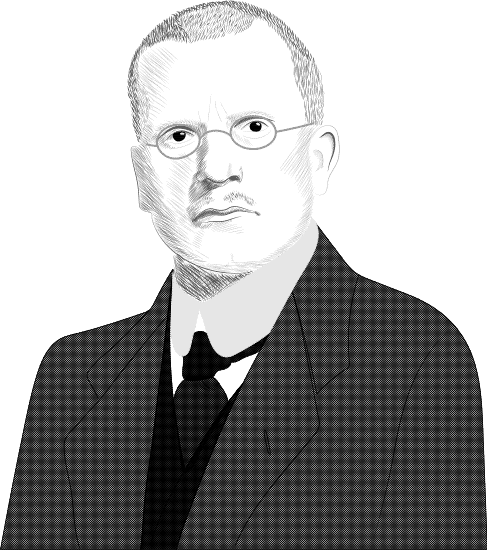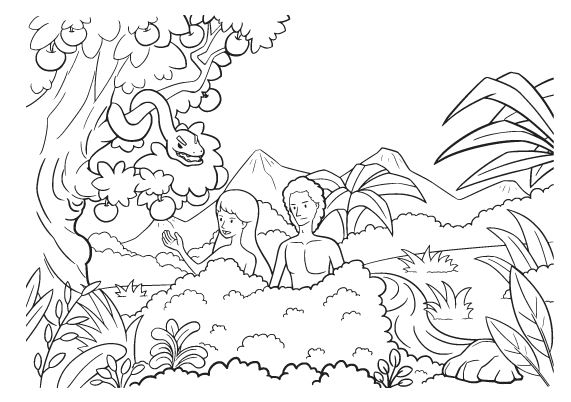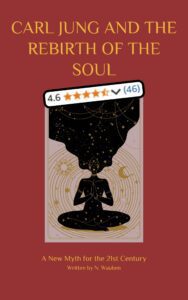Table of Contents
About this Series
Hello everyone in this series I attempt to make an in-depth analysis of The Red Book written by Carl Jung. I believe that only a thin line separates insanity from genius, and I believe that this book is a great example. I will discuss several parts of The Red Book to find out whether this might be the craziest book ever written. This is part 2 of this series. Those who have already read part 1 (The Time and Depth Spirit and Finding your Soul) can skip the first two paragraphs. If you have not yet read part 1 it might be best to begin with part 1. (Part 1)
Background to The Red Book
Carl Jung – The Red Book; the craziest book ever written? Many will agree that The Red Book is perhaps the most unique book ever written. Reading The Red Book is quite an intense experience and some parts are so powerful that they might literally blow you away.
The background to The Red Book is a unique story on its own. Even though The Red Book is now considered to be one of Carl Jungs’ most important works, it was not accessible to the general public until 2009. The edition that I read, “Reader’s Edition” , dates from 2012 and is more accessible to the general reader than the 2009 edition because of its size and price, it can be found here on Amazon: https://amzn.to/3pglacO Adding to the mystery it has been argued by a few critics that Carl Jung was having a psychosis during the time that he was writing The Red Book.

What is The Red Book all about?
In The Red Book Carl Jung is going on a unique adventure. He is not travelling to a different country or going to climb a mountain, instead he is going on an adventure within his own soul. He confronts his unconscious and from the insights that he finds he destroys and recreates his own life. It is argued that he found the insights that would later be the most important pillars of his work while exploring the depths of his unconscious.
Short Summary of Part 1 and an Introduction to Part 2
In the first part of this series, we have discussed how one should ‘approach’ one’s soul and the importance of the two ‘dimensions’ during this process: (1) The spirit of the times and (2) the spirit of the depths. We usually live in the former dimension, while our soul can be found in the latter dimension. We have also learned that one should look inward to find one’s soul; if one were to put too much value on external things one might drift away further from one’s soul. In another famous book, Aion, Carl Jung indicates that this inner schism can have some serious implications for the individual as well as the entire world: “The psychological rule says that when an inner situation is not made conscious it happens outside, as fate. That is to say, when the individual remains undivided and does not become conscious of his inner opposite, the world must perforce act out the conflict and be born into opposing halves.” (p.71)
Despite the benefits reconnecting with one’s soul can therefore have for the individual and the world in general, reconnecting with one’s soul is complicated. According to Jung this is the case because it is extremely tempting to not set about such a journey because it is a difficult and dangerous journey. In this part we will discuss why Carl Jung thought we should still go on this journey and how we can resist the temptations that arise that arise during this journey.
Temptation #1: Following an Example
Jung argued that it is important for every individual to give a direction and meaning to their own lives. Jung indicated that if one were to live by an example, one would not be living his or her own live: “Woe betide those who live by way of examples! Life is not with them. If you life according to an example, you thus live the life of that example, but who should live your own life if not yourself? So live yourselves.” (p.125)
According to Jung it can be easy to follow an example set out by others, religions, or teachings. However, if one were to do so, his or her own life would remain unlived. Thereby one would not be able to connect with his or her own soul: “Who knows the way to the eternally fruitful climes of the soul? You seek the way through mere appearances, you study books and give ear to all kinds of opinions. What good is all that? There is only one way and that is your way.” (p.125)
Jung further argued that if many people were to follow the same laws and teachings, this would not lead to a greater connection with eachother or with the world, instead it would lead to division and solitude: “Laws and teachings held in common compel people to solitude, so that they may escape the pressure of undesirable contact, but solitude makes people hostile and venomous.” (p.126) Jung indicated that if people were to be encouraged to find their own path and differentiate themselves from others, they would be happier and the world would be a better place: “give people dignity and let each of them stand apart, so that each may find his own fellowship and love it. Power stands against power, contempt against contempt, love against love. Give humanity dignity, and the trust that life will find the better way.” (p.126)
Jung thus argued that, although it is easier to follow the path of other individuals or religions, this can be a dangerous thing. Not only will people not live their own life and thereby not connect with one’s soul, but they will also bread contempt for eachother and themselves.
As Jung indicated in Aion, the world will suffer from these inner conflicts. Instead, if each were to follow his or her own path, people would understand eachother better: “May each one seek out his own way. The way leads to mutual love in community. Men will come to see and feel the similarity and commonality of their ways.” (p.126) Perhaps this is the case because, if everyone is confident enough to follow his or her own path, the paths chosen by others are no threat to one’s own confidence that they are on the right path, since the only right path is entirely defined by yourself, not by religion or idealism.
Temptation #2: The Devil and God
Another temptation that can easily turn any individual away from the path towards his or her soul is the temptation of the devil and God. This can be a rather difficult temptation to resist, according to Jung, even Christ failed to resist the temptation of God: “Christ totally overcomes the temptation of the devil, but not the temptation of God to good and reason […] You still have to learn this to succumb to no temptation, but to do everything of your own will; then you will be free and beyond Christianity.” (p.139)
I do not believe that Jung argued that one should not believe in God, or not be religious, instead I believe that Jung meant that one should not commit oneself completely to either God or the devil. Instead, one should acknowledge the power of both opposites and recognize them as a force to be reckoned with in your life, a positive and a negative force.
Similarly to God and the devil, this is also true for other opposites, order and chaos, love and hate etcetera. According to Jung one should ‘marry’ these opposites to eachother: “You open the gates of the soul to let the dark flood of chaos flow into your order and meaning. If you marry the ordered to the chaos you produce the divine child, the supreme meaning beyond meaning and meaninglessness.” (p.139)

Temptation #3: Virtue
Besides a too big of an attachment to God (Order, meaning, purpose etcetera) being a factor that can turn one away from one’s soul, too big of an attachment to virtue can be risky as well, according to Jung. “If your virtues hinder you from salvation, discard them, since they have become evil to you. The slave to virtue finds the way as little as the slave to vices.” (p.14)
Although virtues are, of course, not necessarily a bad thing, a too big of an attachment to your virtues can make you a slave to your virtues, I believe that Jung meant that, if you are too attached to your virtues, you might be controlling your soul too much: “If you believe that you are the master of your soul, then become her servant. If you were her servant, make yourself her master, since she needs to be rules.” (p. 140)
Conclusion to Part 2
By now we have come to understand why Carl Jung thought it was important for every individual to connect with his or her soul: if inner opposites are not made conscious, they will be acted out upon the world.
Although connecting with one’s soul is therefore particularly important, it is not an easy project. As discussed throughout this post this is the case because there are a few temptations that might lead you away from this path of self-discovery: 1: Following an example 2: the devil and God 3: virtue.
I believe that the main theme of all of these temptations is that we should be especially careful to not limit ourselves too much. We should not limit ourselves by living by an example set by others. At the same time, we should not limit ourselves through an attachment to God (characterized by order, meaning, purpose etcetera). And lastly, we should not limit ourselves through an over-attachment to our virtues. “We believe that we can illuminate the darkness with an intention, and in that way aim past the light. How can we presume to want to know in advance, from where the light will come to us?” (p. 144) We should not blind ourselves from the light by limiting our scope of vision.

